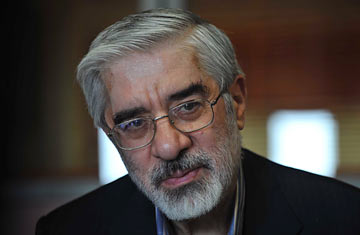
Iranian presidential candidate Mir-Hossein Mousavi during an interview with TIME's Joe Klein and Nahid Siamdoust, June 11, 2009
(2 of 2)
This interview will be published after the election, and you may be President at that point. The last reformist President, Mohammed Khatami, who supports you now, had a difficult time getting along with the leader. Do you think it will be different for you than it was for him?
There are different pillars of power in our system that must interact properly. This is the reality in our system, and I'm willing to have this interaction both in dialogue and in performance of my legal responsibilities. I believe I can balance this interaction.
Do you think the reformists went too far and did not respect this balance?
Khatami's rule came to an end after eight years, but if he had stayed in government, who knows, maybe that balance between the [Supreme] Leader [Ayatullah Ali Khamenei] and other powers would have eventually been reached. But we have a particular system of division of powers in Iran. The Leader has certain powers, and the President has other powers, and balance between these powers is possible.
You and the Leader are both sons of the village of Khameneh. When you were Prime Minister, you were known to have friction in your relationship with the Leader. Do you think this could lead to problems if you become President?
The problems we had then were based in the constitution. But now, of course, these responsibilities are much more clearly spelled out in the constitution, and there is much more room for harmony.
You haven't spoken much about foreign policy during the campaign. If you're elected, will your foreign policy be different from the one that exists now, especially toward the U.S.?
The meaning of foreign policy is not just relations with one country. The U.S. is one of the countries in that group. The criticism that I've had is that we have not used the vast potential that we have to create good foreign policy. In our foreign policy we have confused fundamental issues and matters that are in our national interest with sensationalism that is more of domestic use.
With a change in government, do you think there may be a change in Iran's stance on its nuclear energy program?
We may change our methods. In regard to nuclear energy, there are two issues. One is our right to nuclear energy, which is non-negotiable. The second issue is related to concerns about the diversion of this program toward weaponization. Personally, I view this second part, which is both technical and political, as negotiable. We will not accept our country's deprivation from the right to nuclear energy.
Do you think Barack Obama is more serious about wanting better relations between the United States and Iran? And how do we go about achieving this if you believe it's possible?
Obama has repeated his concerns several times, and this in itself has created a suitable atmosphere for better consideration of these matters. We are hopeful these talks will continue with practical action.
What kind of action would you like to see?
I heard that he expressed regret over the coup d'état of 1953, and that itself is a positive step because it will assuage people's negative mentalities in the country.
Four years from now, if you're elected President, what do you want people to say about Mousavi? What do you want to have as a legacy?
I was a villager. When the revolution happened, it pulled me forward, and now too people don't see me as separate from them. If I become President, I hope that people will have the same feeling toward me now that they had toward me as their child then. Someone who with sincerity is doing his best to work for them. I have tested this: more than caring about results, people care about honesty.
If you don't win, what do you say to all those young people who've been out in the streets, smiling and dancing and so happy? What do you say to all your followers if you don't win?
My message has already reached them. Change has already started. Only part of this change is about winning in the elections. The other part will continue, and there is no going back.
In your Cabinet, how many women will you have?
I don't know the number, but there will be women Ministers. I will announce them if and when I am President.
Will your wife perhaps have one of those positions?
My wife runs away from official posts. I don't think she'll be interested in the least in having a political position. But of course, she has always been by my side as my adviser, and always will be.
